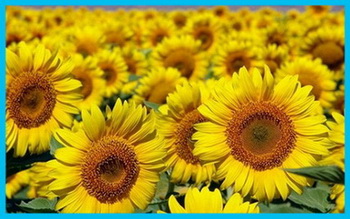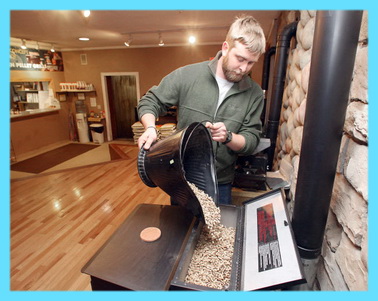SUNFLOWER HUSK PELLETS PRODUCTION

Sunflower husks, also known as sunflower hulls, sunflower kernels, refer to shells of sunflower fruits after the seeds are taken out. It’s a by-product of sunflower seeds deep processing industries. As sunflower is planted widely all around the world, every year a large amount of sunflower seed is harvested. Before, sunflower husks are always thrown away or burnt directly as fuel for sunflower seeds processing. Its utilization rate is low. With the development of biomass pelletizing technic and the invention of biomass pellet machines, sunflower husk has become a promising raw material for biomass pellets processing.
Sunflower husk is an ideal raw material for biofuel pellet processing. Its main ingredient is cellulose, which is a hydrocarbon with high calorific value. Besides, sunflower husk is quite dry and can reach the moisture content limit of 8-10% for biomass pellet making. Thus the drying fees for a wood sawdust dryer is avoided to cut down the production cost. However, sunflower husk is with uniform size about 1-3cm, it can’t be used for processing pellets directly and a small wood hammer mill is needed. After simply crushing, sunflower husks can be used for sunflower husk pellets making. Because sunflower husk is soft material, it will be easy for the biomass pellet machine to press it into biomass fuel pellets.

Wait for the temperature of sunflower husk pellets to cool down and then you can store them in bags for use. Pressed by biomass pellet machine, the density of sunflower husk pellets has been increased. Thus it can burn longer in pellet stove. With uniform size and shape, sunflower husk pellets burn more efficient and little smoke is released during its burning. With low price and high efficiency, sunflower husk pellets will give you a clean and cozy experience for biomass energy.

With the development of the biomass pelletizing technic, making sunflower husk pellets has acquired some achievements in sunflower main origins including: Russia, Argentina, the United States, China, France, Spain, Turkey, Romania, the Netherlands, New Zealand and Thailand. With the increasing installation of new-type biomass pellet plant, sunflower husk pellets application has expanded from simple home use to industrial boiler, power plant, hospital and commercial heating etc. We are professional with biomass pelletizing technic and the new-type biomass pellet plant designed and manufactured by our company has a lot of advantages for sunflower husk pellets processing.
Sunflower husk pellets are made of the husks of sunflower seeds left over from the process of kernel extraction during the production of sunflower oil. The granulation process (creation of pellets) occurs under high pressure, without the addition of any chemicals.
Sunflower husk pellets can be a good alternative to wood pellets. They are usually used for combustion at power plants working on biomass and for industrial boilers. Sunflower husk pellets typically have an ash content of 2-3%, versus wood pellet ash content of 1-1.5%. However, due to a more attractive price, sunflower husk pellets are increasingly used for co firing with wood pellets or coal to get a better price-to-GJ ratio.
Sunflower husk pellets is an environmentally friendly type of fuel. During its combustion the amount of CO2 released is comparable to the amount released during natural decomposition.
Our company offers sunflower husk pellets on three directions: the Baltic Sea, the Black Sea and the Mediterranean Sea. More detailed information can be obtained by sending a request to our e-mail [email protected].
Geographical distribution
Sunflowers, as a kind of oil-bearing crop, occupy over 2% of the world’s cropland on a large scale. Sunflower prefers temperate latitudes and they are grew in southeastern Europe, the European part of Russia, South America and other temperate regions.
Throughout South America, in addition to wheat belt and soybean belt, sunflower belt is also one of major crop belts. Although sunflowers are cultivated in many parts of the world, South America has the only sunflower belt. In fact, sunflowers are the third-ranking crop in southern South America up to 12.3% of all the cropland. In Southern Europe, the amount of sunflower crop reaches 5.9% as the fourth crop. In Southern Africa, the proportion of sunflower crop amounts to 6.3% as the third crop. In European Russia, the amount of sunflower crop is 6.0% as the fourth crop. Also, China is the fourth largest sunflower-producing country in the world.
Fuel value of sunflower husk
Oil and coal are commonly used for heating. However, increasing costs and environmental concerns related to fossil fuels have led to an increased demand for alternative heating fuels. Substantial amounts of agricultural biomass having a relatively low lignin content have been provided. The following table shows the reported properties of sunflower husk as biomass fuel over a variety of agricultural biomass fuels.
|
Fuel value of sunflower husk |
||
|
Property |
Sunflower hulls |
Wheat middlings |
|
Moisture(%) |
8.65 |
12.58 |
|
BTU/Ib |
8474 |
7228 |
|
Ash(%) |
2.86 |
5.18 |
|
Sulfur(%) |
0.14 |
0.15 |
As we all know, a low ash content is required for a heating fuel. Ash produced by burning fuel may result in fouling of equipment and air pollution. Typically, an ash content of no more than about 3% is desirable. Given the above analysis, sunflower hulls cause a relatively low ash content of 2.86% during heating process. Besides, the heating value of at least about 6800 BTU/lb is preferable for combustion. Sunflower hulls possess the highest heating value of 8474 BTU/lb among the four biomass fuels.
Other properties, such as sulfur and moisture content also have remarkable effects on pellet fuel performance. High moisture content in a fuel may reduce efficiency. The amount of moisture content of sunflower hulls is the lowest up to 8.65% compared with other agricultural crops. Likewise, high sulfur contents can lead to pollution in the course of combustion. Sulfur content of 0.14% with regard to sunflower hulls is suitable during heating process. All in all, sunflower husk is a promising alternative biofuel.
